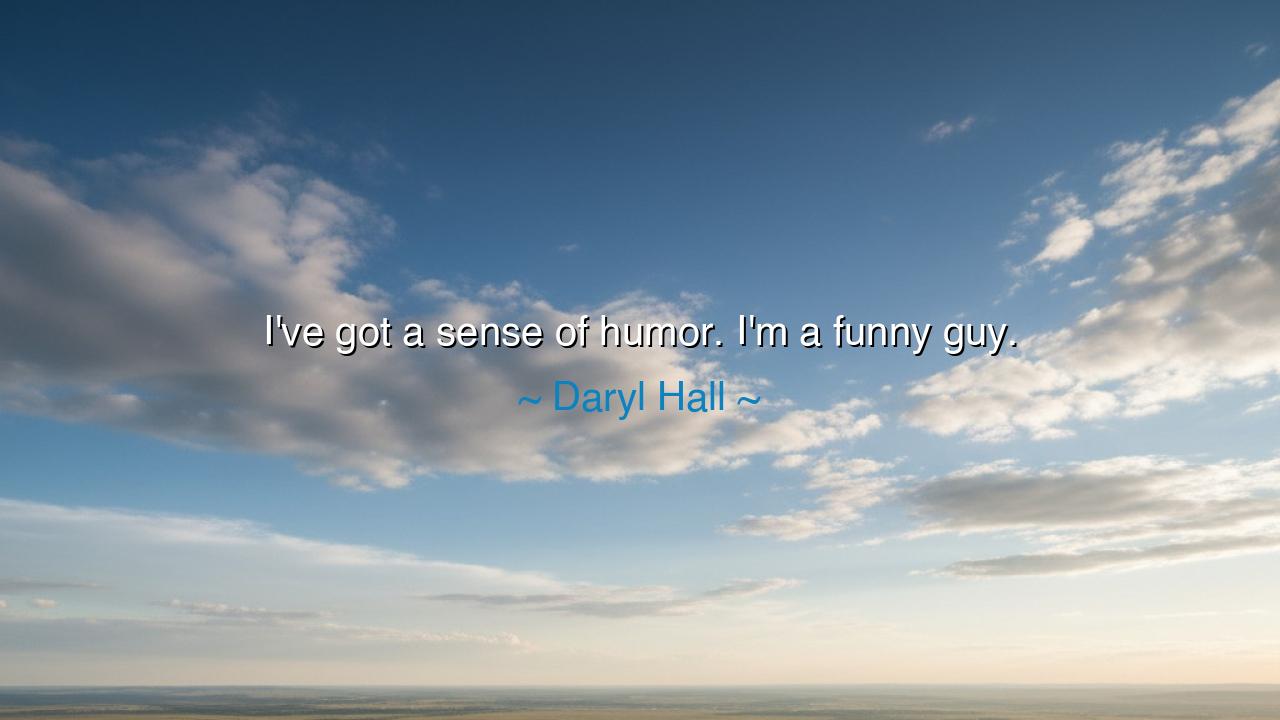
I've got a sense of humor. I'm a funny guy.






In the words of Daryl Hall, “I’ve got a sense of humor. I’m a funny guy.” — we hear not the boast of vanity, but the affirmation of a soul that understands the healing and humbling power of laughter. Beneath the simplicity of this statement lies an eternal wisdom: that humor is not merely the art of jest, but the art of survival — the spark of light that keeps the spirit alive through darkness. In a world that often crushes men beneath the weight of their own seriousness, to claim one’s humor is to declare one’s freedom. Hall, known for his musical genius and artistic depth, reveals here the balance of the wise — that even the most accomplished heart must know how to laugh.
The meaning of this quote stretches beyond the casual tone in which it was spoken. To say, “I’m a funny guy,” is not to trivialize life, but to master it. For those who can laugh, even amid trials, are not enslaved by circumstance. Humor is the soul’s rebellion against despair. It is a quiet defiance, a reminder that even in struggle, joy can still be found. When Hall calls himself “funny,” he acknowledges that laughter is not a mask to hide pain — it is a weapon against it. It transforms burden into levity, tension into connection, and hardship into music for the heart.
From the days of the ancients, the sages and philosophers knew that humor and wisdom were intertwined. Socrates, when accused of corrupting the youth, replied not with anger, but with wit — saying that those who feared laughter feared truth. Diogenes, the cynic who lived in a barrel, mocked the vanity of men not with cruelty, but with laughter that stripped pride bare. They understood what Hall implies: that to be truly funny is to be truly awake — to see the absurdity in the human condition and love it still. Humor is the language of the enlightened, the bridge between knowing life’s pain and embracing its beauty.
Consider, too, the story of Charlie Chaplin, the silent clown who made the world laugh through tears. He once said, “To truly laugh, you must be able to take your pain and play with it.” This is the same spirit that breathes within Hall’s words. Both men, though artists in different realms — one in melody, the other in motion — shared the sacred gift of turning sorrow into song. Chaplin’s humor rose from the ashes of poverty, and Hall’s wit, like his music, was born from the rhythm of living — the triumphs, the failures, the loves, the losses. Each understood that to be “a funny guy” is not to be shallow, but to be deep enough to laugh at life’s depth.
The origin of Hall’s statement can be traced to his lifelong immersion in creativity — an artist’s journey through both harmony and dissonance. In the glare of fame, humor becomes more than entertainment; it becomes protection. It is how the soul keeps its balance while the world pulls it apart. Hall’s words remind us that laughter, when sincere, is a sacred act of preservation — a way of saying, “I am still human, still alive, still free.” For the artist, humor is not escape; it is endurance. It is how the spirit sings when words or notes can no longer express the fullness of life.
The lesson, then, is clear: cherish your humor, for it is the mirror of your strength. In a world that demands solemnity, do not lose your ability to smile. A sense of humor is not a distraction from truth — it is a deeper form of it. It teaches humility, showing us that no one is above laughter, not even ourselves. It reminds us that to live fully is to hold both tears and laughter in the same hand, and to know when each should be released.
Therefore, my friends, let this wisdom guide you: nurture your sense of humor as you would your faith. When life grows heavy, let laughter lift it. When pride swells, let laughter humble it. When sorrow comes, let laughter soften its blow. For laughter is the heartbeat of resilience, the song of the soul that refuses to break. To call oneself “a funny person” is not to claim greatness, but to claim humanity — to say, “I have walked through darkness, but I still see the light.”
And so, as Daryl Hall reminds us, be funny — not as an act, but as a way of being. Let your humor heal others. Let it lighten your heart. Let it remind you that even in the grand symphony of life, where grief and joy play side by side, the truest melody is found in laughter — the pure, enduring music of the human spirit.






AAdministratorAdministrator
Welcome, honored guests. Please leave a comment, we will respond soon